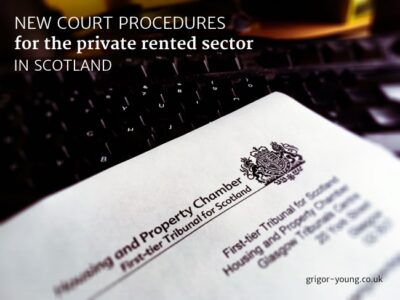From 01 December 2017, new legislation came into force in Scotland which means that Sheriff Courts no longer have jurisdiction for civil cases relating to the Private Rented Sector in Scotland.
The new court for cases of this type is the Housing and Property Chamber in Glasgow. It’s a form of Tribunal.
Note that the regime for court actions for evictions and rent arrears has not changed for local authority and social landlord tenancies. They are still in the Sheriff Court.
Here are some FAQs about the new system.
How much does it cost to raise the action?
It’s free of charge. In the Sheriff Court, on the other hand, it costs £102 to raise a Summary Cause action for eviction and/or rent arrears.
What procedural differences are there?
One obvious difference is that, under Sheriff Court procedure, you can raise claims for eviction and rent arrears in one action. Under the tribunal procedure, you have to raise these as separate claims.
It’s a form-filling exercise and, for example, in the situation described, you would use Form E for the eviction claim and Form F for the rent arrears claim.
If you have an action raised against you, as a tenant, and wish to make a counterclaim, you have to make that claim as a separate application (which the tribunal may later direct should be heard together with the principal claim against you).
This is now very much an online application procedure and there is guidance on the website for the tribunal which lists the various types of application you can make, with links to the appropriate form.
The tribunal has much greater proactive powers than the Sheriff does in terms of making inquiries and requiring parties to attend hearings, or produce documents or information. The tribunal may also hold a case management discussion to decide how an application should proceed. This can be held as a physical hearing or via telephone/video conference.
What procedural similarities are there?
As under Sheriff Court procedure, the court/tribunal does not enforce its own orders. It does not guarantee that a ruling in your favour will lead to ultimate success.
So, for example, if the tribunal makes an order in favour of a landlord for payment of rent arrears, if the tenant does not pay up voluntarily, the landlord will have to engage (and pay for the services of) Sheriff Officers to seek to enforce the decree. The tribunal does not carry out the execution of any orders it makes.
What about recovery of legal costs and expenses?
Under Sheriff Court procedure, the court will usually award the expenses/costs (on the judicial scale) of the action against the unsuccessful party.
Where the award of expenses is in favour of a landlord who has obtained an order for eviction and payment of rent arrears, say, in practice, it is often difficult to recover the expenses anyway. The fact that someone is in rent arrears tends to indicate wider financial problems and you cannot extract payment from someone who does not have any assets – Sheriff Officers will not be able to improve that position.
Under the tribunal system, it does have power to award expenses but only in restricted circumstances.
The Sheriff Court “expenses follow success” rule means the winner almost automatically gets an award of expenses. In the tribunal, to get an award of expenses against a party, you’ll have to demonstrate unreasonable behaviour by that party in the conduct of the case and that that has put the other party to unnecessary or unreasonable expense.
Although the recovery of legal costs in this area in the Sheriff Court is not without its problems in practice (as described), the tribunal system seems to be actively discouraging the involvement of solicitors because it is so unlikely that the tribunal will make an award of expenses.
How long does it take?
This is a relatively new procedure, so it is still bedding in.
Our experience under Sheriff Court procedure was that, if your claim as the landlord was based on proper paperwork and pre-action procedure, you could expect to get an eviction order within 3 months of raising the action.
From our limited experience of the tribunal procedure, it seems to take a bit longer, though it’s not clear how much longer.
Actions which used to be raised locally in Elgin Sheriff Court now have to go through a tribunal based in Glasgow. In one case we have, a case management discussion has been fixed to take place in a hotel in Inverness. The tribunal, theoretically, has power to grant final orders at a case management discussion. If it does not, however, we are not sure whether any “final hearing” will be fixed to take place in Inverness or Glasgow or somewhere else.
How we can help
If you have any questions about any matter arising from this article, please contact us. You can call us on 01343 544077 or send us a Free Online Enquiry. All initial enquiries are at no charge and without obligation.
Though this other article on the G&Y website must be read subject to what is contained in the present posting, above, it contains information you may also find helpful in relation to evicting tenants from residential property.
There is also more information on the “Leasing” section of this website.


 Central Elgin “open for business” despite temporary closure of North Street to vehicles
Central Elgin “open for business” despite temporary closure of North Street to vehicles